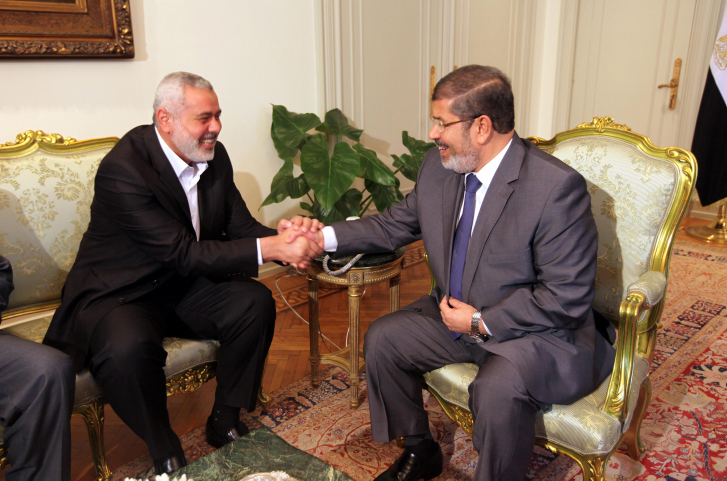Hamas' unity agreement with Fatah is a desperate attempt to break out of local and regional isolation. It does not bode well for Israel.
Hamas seems to have reached a new low • In the wake of the ‘Arab Spring’ and the organization’s own bad decisions, they are starting to lose their traditional sponsors • Syria and Iran are distancing themselves and the friendly ‘Muslim Brotherhood’ regime is now an openly hostile military one • Stuck inside Gaza with the Islamic Jihad as a rival, Hamas is searching for a way back into the spotlight – hence its latest attempt at ‘unity’ with the PA

An “historical agreement” was recently signed between the “moderate” Fatah and Hamas, at the center of which is the establishment of a joint government, organizing for elections and absorption into the Palestinian Authority. Azzam al-Ahmad, a senior Fatah official and member of the delegation to Gaza, made clear that the purpose of the union was so the two organizations “could focus their efforts on the Israeli occupation,” but many commentators still wonder what the Authority’s real intentions are.
No less important is the question of why Hamas chose to sign the agreement, and why now? A close look at the situation of the rulers of Gaza, beyond the grand slogans and colorful propaganda, would reveal a battered, beaten and isolated organization. Both events in the broader Middle East and the leadership’s own missteps have led the organization into a difficult local and regional bind.
Fall from grace
It all started with the outbreak of the Syrian Civil War. “Khaled Mashal’s dithering on choosing between the Hizballah-Syria axis and the rebels, caused Assad to lay down an ultimatum: support or imprisonment,” according to military sources in Syria. Mashal chose option C and fled the country along with other Hamas leaders.
With time, things became clearer: reports on Hamas members alongside Syrian rebels proved that they had betrayed their dedicated friend, Bashar Assad. This betrayal included a public attack on Hezbollah which called on it to withdraw its forces from Syria and aim its weapons only at Israel. Hamas arrogantly argued that “the Palestinian issue is the central issue of the Arabic and Islamic Ummah and resistance to the Zionist occupation is the most important institution,” and therefore Hezbollah must stop supporting Assad and “preserve the unity of the Ummah.” Needless to say, this did not go down well with Hezbollah.
The organization’s difficulties increased with the assassination of Ahmad al-Jabari, the head of Hamas’ military wing, on November 2012. Meantime, the Islamic Jihad movement has grown at Hamas’ expense and has begun to breathe down their neck. Even though the Islamic Jihad has no political aims, only violent ones, its popularity and military might may undermine the Haniyeh government in Gaza. Indeed, the most recent escalation in Israeli-Palestinian violence was led by Islamic Jihad, which was also the one to give a name to their “operation”: breaking the silence.
In contrast to Hamas, Islamic Jihad has succeeded in maintaining warm ties with Syria. Islamic Jihad’s general secretary Dr. Ramadan Shalah stated in a 45 minute interview with al-Jazeera that “most of us are not for sale” – a possible jab at Haniyeh and Mashal who are trying to limit his power. Shalah made clear that “we are no interested in escalation and are aware of our capabilities, but we are united with Hamas and the other factions in our right to respond,” thus casually equating Hamas with “other factions” and discounting Hamas as a superior force.
Another sign of Hamas’ weakening grip on Gaza was the arrest of one of its veteran leaders, Iman Taha, on charges of corruption. The fact that a totalitarian government arrests one of its own members on such a charge to placate public opinion shows just how much pressure the organization is under.

In search of a new patron
The turbulent events in Egypt also spell trouble for Hamas. Ehud Yaari said it best in a report prepared for the Washington Institute for Near Eastern Policy. Yaari explained that “The latest and most painful loss for Hamas came next door in Egypt, where President Muhammad Morsi was ousted and the group's parent movement, the Muslim Brotherhood, was defeated in the struggle for power”. Indeed, today the Egyptian government is hostile to both the Brotherhood and Hamas, which have been made illegal, and has harmed it both economically and militarily. The crossings between Gaza and Egypt are almost totally sealed off, weapons no longer flow like they used to and Muslim Brotherhood funds have been confiscated. Hamas has thus also lost the financial support of its greatest ally.
Now Hamas is searching for a patron to replenish its lost strength, both in terms of its sovereignty in the Gaza strip and on the international stage. The Hamas political headquarters is now stationed in Qatar, but this is a temporary solution that can’t last. Qatar may be a big backer of Islamist rebels in Syria and of the Muslim Brotherhood, but it also has military ties with the United States, and therefore avoids supporting Hamas’ terrorist activities and weapons industry. Furthermore, the Gulf States headed by Saudi Arabia are putting Qatar under heavy pressure to toe the line and stop supporting irredentist organizations like Brotherhood.
Mashal understands this and has tried to leave the country, but Qatar’s ruler, Emir Tamim bin Hamad al-Thani is not about to give up so easily. From his perspective, Hamas’ presence in Qatar gives him influence over Hamas and events in Gaza, and he therefore informed Mashal that if he leaves, Qatar’s financial support will cease. Given that Qatar, Hamas’ primary backer, has so far transferred close to a billion dollars to the strip, this is a price Mashal cannot pay – and therefore he’ll be staying there for a while.
Gestures to Iran and Erdogan
In recent weeks it would seem that Hamas has placed renewed hopes in the Ayatollahs of Iran. After contact between them was cut off when the former fled Syria, there was a recent secret meeting in Qatar, in which according to various reports Ramadan Shalah coordinated a visit for Khaled Mashal in Iran in less than a month, in order to renew the ties of old and end the current freeze.
According to sources in the gulf, Khaled Mashal expected to move his HQ to Iran after his visit there. Hamas hopes that attaching itself to the Shiite terror power, which is improving its ties to the West, will provide it with a strong wall to lean on with all the turbulence happening around it, and perhaps even allow them to reconcile with their former buddy Bashar Assad.
The increasing impression is that Hamas is reaching out to anyone and everyone who can help them out. One of the most visible signs of this is a massive billboard placed by the regime in Gaza on one of its major streets with the profiles of Haniyeh, the Emir of Qatar, his son and Turkish Prime Minister Erdogan. Next to them is the slogan “Jerusalem is waiting for its men.”
In order to make clear that warming up to Tehran does not mean spurning the Turkish leader Erdogan, with the latter’s clear victory in recent Turkish local elections, hundreds of Hamas activists hit the streets to visibly celebrate this victory. But Hamas cannot keep playing the field. At some point it will have to choose a side, and if it chooses Shiite Iran, the relationship with the Qatar-Turkey axis will suffer accordingly.

Jihad is our life
The strengthening ties between Hamas and Iran and its increasing attempts to show they’re better than local Islamist terror factions have made them become more extreme religiously and militarily and distanced it from the more moderate Arabs states. Iran is a militant and suffocating power; there is no way they will allow Hamas to operate independently. The first to suffer from Hamas’ growing extremism are the residents of the Strip itself. The Gaza parliament is already preparing to change the constitution so that the laws are more “religious.” Lashes, a favorite of the Iranian penal system, are on their way into the Gazan legal system. The choice of Iran may even increase the hostility between Hamas and Egypt and even that of the rebels in Syria. Hamas is trying to moderate this tension by cutting a deal with “moderate” Fatah.
A deal with the PA helps Hamas break out of its isolation in many ways. It allows them influence in the West Bank rather than just Gaza, while establishing their exclusive right to power in the latter against the Islamic Jihad. It gives them a shot at leadership of the Palestinian population in upcoming elections; even if they lose, they would still likely be part of a coalition government and probably on a local level as well. It would also allow them to continue to keep moderate Arab countries within reach even as they court Iran.
Precisely because of all this, Israel should be worried about Hamas’ increasing rapprochement with Iran. An extremist declaration of Khaled Mashal was released shortly after his visit to Iran: “the Palestinian nation will not stop the path of Jihad until the liberation of Palestine from the river to the sea and the full liberation of Jerusalem.” Days before signing the agreement with Fatah, Isma’il Haniyeh backed up Mashal, stating that “abducting soldiers is a top priority for Hamas.” It’s hard to believe that Abu Mazen will be able to moderate them, which will likely lead to an explosion and another round of violence in the strip.
English translation by Avi Woolf.
To receive updates on new articles in English, join Mida on Facebook or Twitter or join our mailing list.






